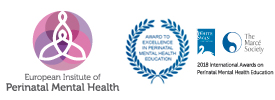OUR PHILOSOPHY
An ecosystemic perspective

Our Institute fosters an
ecosystemic perinatal perspective, which recognizes the importance of, and integrates, the following:
- Neurobiological processes of pregnancy, birth and breastfeeding, with special emphasis on the emotional needs of the infant and mother-baby dyad – understanding that the newborn’s habitat is the mother and that the bond with the father is equally important though different in its development.
- Attachment theory developed by John Bowlby, as well as more recent input from the fields of pre- and perinatal psychology and from Urie Bronfenbrenner´s human ecology perspective.
- Understanding of family dynamics from systemic analysis, and the intergenerational transmission of attachment styles.
- Sociopolitical analysis which includes gender perspective and the understanding of the inherent difficulties to parenting due to socio-cultural contexts and their restrictions.
- The need to bet on prevention strategies in perinatality, as well as treatment options that are both sustainable and respectful to breastfeeding.
The training we offer is:
- Ecopsychological. We try to understand the nature of psychological processes, starting at the paradigm of ecopsychology that includes the need to bond to nature as a central aspect of humanity, together with Attachment Theory (John Bowlby) Hence the need to know and deepen perinatal neurosciences and the physiology of childbirth, among other topics.
- Holistic. We integrate the most recent scientific studies with knowledge provided by other disciplines, including those that harness the power of ancestral wisdom. In this way, we impart the understanding that the whole of the human being is much more than the sum of its parts, and we aspire to maintain the body-mind-soul connection from the very beginning of life.
- Open. Our training is aimed at all professionals who provide care at different stages of motherhood, and who therefore have a direct impact on the emotional and mental health of mothers and babies, including midwives, doctors, nurses, psychologists, doulas, lactation consultants, and more. Because our training is cross- and multi-disciplinary, it promotes a holistic view that benefits both the participants and the families they serve.
- Rigorous. We prioritize quality and clarity in the transmission of knowledge. We return to original sources with a critical eye that allows us to dismantle some classic theories that have turned out to be very harmful to the health of mothers and their families. Like our trainees, our sources are eclectic, coming from many different and complementary disciplines. Our training is replete with bibliographical references so that students can easily return to source material to increase their knowledge.
- Up-to-Date.Our training includes timely topics such as the mental health of professionals who attend births, the early detection of attachment disorders, obstetric violence and the introduction of mother-baby psychotherapies.
- Practical. We offer an eminently practical, well integrated training that trainees can make use of immediately in their professional lives; we don’t just teach theory and history. Through our teaching, we seek to transmit our collective years of education, care provision and activism in equal parts.
- Respectful and non-judgmental attention to mothers and babies is of paramount importance for us. We believe that well trained professionals are key to the prevention of perinatal mental disorders and to that end we work to end any type of abuse, disrespect and obstetric violence.
- Dynamic. And therefore, constantly evolving. When we train, we are also always listening and learning. The most effective forms of learning involve an experiential component. For us this means prioritizing listening to mothers and their experiences and pointing out opportunities for introspection and deeper understanding.
- Quality. We collaborate with expert professionals of international renown throughout the course, to offer our trainees access to the best minds in the field.
- Flexible. You can attend in person (Madrid) or online, either in real time or during the eight weeks following the training date. (Perinatal Mental Health Training) It is possible to enroll in the training in one modality (face-to-face or online), and change to the other for a seminar or for the entire training if the circumstances change. With this flexibility we have made our training available to the greatest number of students possible.
- Sustainable. We have kept prices to a minimum, and we offer financial support to those students who need it through our grant program.


